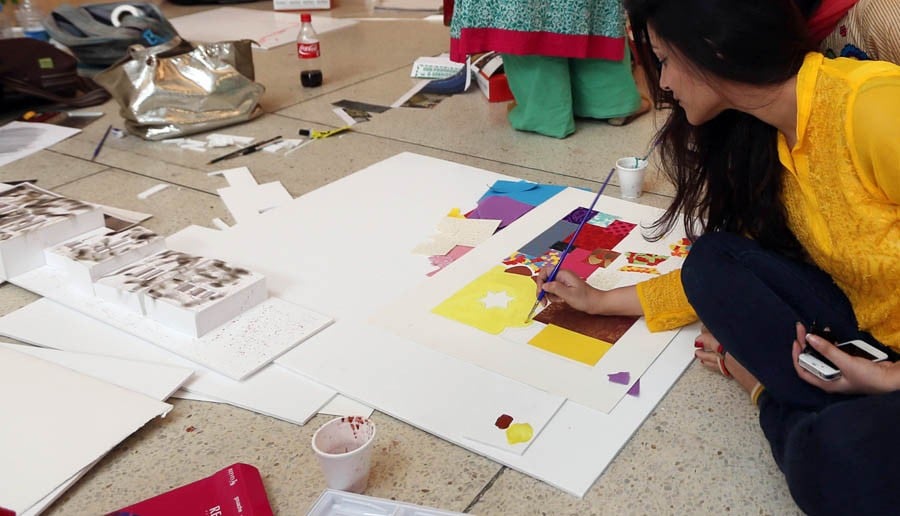
The fear of the unknown is the greatest distinction between us and prior generations

For our parents, the threats Pakistan faced in their youth were predictable and clear as day. The military was all-powerful, public floggings were the norm, Jamat-e-Islami student wings terrorized college campuses, and Altaf bhai was crowned the King of Karachi. Zia’s reign of terror instilled fear, silenced an entire generation, and was the single-greatest threat to prosperity and freedom in Pakistan.
Three decades on, fear continues to be omnipresent in the lives of 20-somethings. Except today, the actors perpetuating fear are veiled. They are capable of abducting elected legislators and disappearing academics in broad daylight. Our parents clearly knew they were up against the government of the time. We, the Generation Z of Pakistan, do not fully comprehend the magnitude and scope of the threats we face.
The fear of the unknown, for me, is the greatest distinction between us and prior generations. Unfortunately, consistent despair stretches beyond the political and permeates every aspect of our lives -- social, economic, personal or public; each plagued by abiding anxiety. Every waking moment of our day is documented, personal lives are public, and all the information we need is a quick Google search away. Yet, many of us appear not to realize the consequences of the updates we post or know how to process the abundance of news we receive. We are a generation of paradoxes steeped in fear.
Unlike any generation before us, tales of our misspent adolescence and youth are fully accessible on Facebook and Instagram. Our evolution though trackable is ironically limited by the facades we project on our social media.
Online presence is highly curated: photos filtered, geo-tags carefully inserted, and causes blindly supported. Our virtual existence is almost entirely a product of our anxieties, shaped by overexposure to the lives of those we follow online and offline. Even though we seek privacy, social media engagement is second-nature. A quick glance at Instagram stories on a Friday night is a reiteration of what we lack and aspire to gain. The fear of missing out deeply impacts our self-worth, reducing us to the opportunities missed and our undesirable lives in that fleeting moment.
Misleading Instagram accounts often directly conflict with our personas on Twitter; the second-home of Gen-Z social justice warriors.We complain about the incestuous nature of elite Pakistani circles while directly benefitting from the privilege they extend. Conversations acceptable in close-door social settings suddenly become impermissible. There is no room to falter, to evolve, to change positions. Actions belie professed beliefs, as long as said beliefs are socially and politically salient. 160 characters, a like here, a retweet there, are enough to determine one’s personal politics and strength of character. 25-year-olds are expected to defend their tweets from when they were 18; 18 year-olds are expected to display the maturity of the ideologues they worship.
Despite being supporters of free thought, we stifle critical thinking in its tracks by trolling down an opinion or thought that differs or questions our own. Trolling online in many instances stems from fear due to a lack of knowledge or social pressures resulting from steering a course against the tide. Through our social media feeds, we create self-righteous echo chambers which then compete against each other to establish utmost moral superiority.
Even though we brew in fear, we are also a generation which believes that we can have it all. We can juggle multiple careers, travel the world, fight for flexible work hours and flatter management structures, and have equal pay for equal work. Even though we may conform, we don’t seek to live cookie cutter lives in suburban homes, with 9 to 5 jobs, and defined gender roles. We have greater sexual freedoms across gender and socio-economic lines and aren’t afraid to seek reproductive healthcare when needed. Fewer people in our generation argue against education, healthcare, and a clean environment being state-guaranteed human rights.
Some of these observations are not Pakistan-specific, nor are they accurately representative of Pakistani youth as millions lack access to education, the Internet, and smartphones. However, they speak to the microcosm I belong to and grew up in, which is urban, privileged, and English-speaking.
Social media, much like our current leadership and the invisible hand operating it, is driven by a scarce set of rules. Our generation cannot imagine a world without our smartphones, and Uncle Sam watching each move we make on them. These realities are ingrained in our DNA. As an age-group, it is delusional to assume that technology liberates us from our personal and political shackles. Rather, it does the exact opposite.
Glimmers of hope have been consumed by establishment structures which exacerbate our sense of inadequacy in the personal, and make us physically impotent in the political. Our enemy is stronger than ever and we don’t know how to fight it.